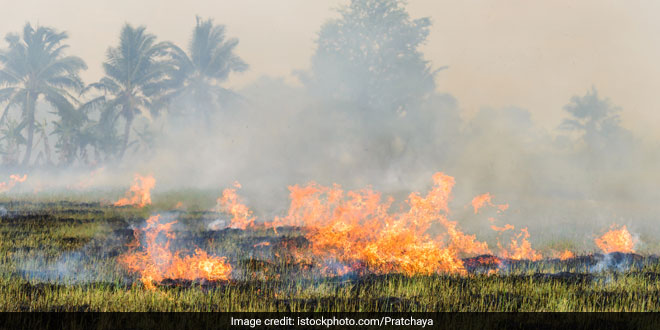Washington: The massive air pollution in Northwestern parts of India, which aggravates every winter, is linked to the efforts by farmers in the region to conserve groundwater, according to a research carried out by a group of scientists from the US, Mexico, and India. The study published in the latest issue of Nature Sustainability, reveals how water-use policies require farmers to transplant rice later in the year, which in turn delays harvests and concentrates agricultural burnings of crop residues in November – a month when breezes stagnate – leading to increased air pollution.
The study, “Trade-offs Between Groundwater Conservation and Air Pollution From Agricultural Fires in Northwest India,” was a collaboration between researchers from Cornell and the International Maize and Wheat Improvement Center (CIMMYT).
The participating scientists analysed groundwater conservation policies and their effect on the timing of farmers’ planting and harvesting crops and burning crop residues. They also connected this information with meteorological and air pollution data, according to a media release issued by Cornell University.
Also Read: Uttar Pradesh Highways To Soon Have Herbal Plantations For Clean Air
This analysis shows that we need to think about sustainable agriculture from a systems perspective, because it’s not a single objective we’re managing for – it’s multidimensional, and solving one problem in isolation can exacerbate others , said Andrew McDonald, associate professor of soil and crop sciences and a co-author of the paper.
Balwinder Singh, a cropping systems simulation modeller at CIMMYT in New Delhi, India, is the paper’s first author. Amit Srivastava at CIMMYT in New Delhi and Bruno Gerard at CIMMYT in Mexico City are the other two co-authors of the study.
Northwest India suffers from two critical sustainability issues: air pollution and groundwater depletion, the study said. Almost 1.1 million Indians died from air pollution in 2015, adding up to costs equalling 3 percent of the country’s gross domestic product, according to the study. Groundwater depletion is an ongoing issue, and rice cultivation is particularly water-intensive.
News reports in June shed light on water scarcity in Chennai, in the south; in the northwest, two groundwater conservation measures enacted in 2009 delayed groundwater use by farmers until later in the season. The acts ultimately prohibited transplanting rice into paddies until after June 20, the study said.
Farmers must quickly clear residues immediately following rice harvests in this area, known as India’s bread basket, to prepare fields for planting wheat that grows in the winter, it added.
Scientists recommend that solutions could include new agronomic technologies such as the tractor-mounted Happy Seeder, a device that allows farmers to drill through heavy crop residues and plant seeds without burning. They might couple such advances with shorter-duration rice varieties that offer flexibility in planting and harvesting dates.
Other options include investigating alternative uses for crop residues, such as collecting and selling biomass for power generation, bio-char creation, or as material for paper or furniture, the university said the statement.
NDTV – Dettol Banega Swachh India campaign lends support to the Government of India’s Swachh Bharat Mission (SBM). Helmed by Campaign Ambassador Amitabh Bachchan, the campaign aims to spread awareness about hygiene and sanitation, the importance of building toilets and making India open defecation free (ODF) by October 2019, a target set by Prime Minister Narendra Modi, when he launched Swachh Bharat Abhiyan in 2014. Over the years, the campaign has widened its scope to cover issues like air pollution, waste management, plastic ban, manual scavenging and menstrual hygiene. The campaign has also focused extensively on marine pollution, clean Ganga Project and rejuvenation of Yamuna, two of India’s major river bodies.




























